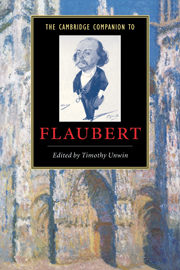Book contents
- Frontmatter
- 1 Gustave Flaubert, the hermit of Croisset
- 2 Flaubert’s place in literary history
- 3 Flaubert’s early work
- 4 Flaubert’s travel writings
- 5 Flaubert’s correspondence
- 6 History and its representation in Flaubert’s work
- 7 Death and the post mortem in Flaubert’s works
- 8 The art of characterisation in Flaubert’s fiction
- 9 The stylistic achievements of Flaubert’s fiction
- 10 The writing process
- 11 Flaubert and the visual
- 12 The theatre in the work of Flaubert
- 13 Flaubert’s failure
- 14 Flaubert, our contemporary
- Select bibliography
- Index
- Series List
2 - Flaubert’s place in literary history
Published online by Cambridge University Press: 28 May 2006
- Frontmatter
- 1 Gustave Flaubert, the hermit of Croisset
- 2 Flaubert’s place in literary history
- 3 Flaubert’s early work
- 4 Flaubert’s travel writings
- 5 Flaubert’s correspondence
- 6 History and its representation in Flaubert’s work
- 7 Death and the post mortem in Flaubert’s works
- 8 The art of characterisation in Flaubert’s fiction
- 9 The stylistic achievements of Flaubert’s fiction
- 10 The writing process
- 11 Flaubert and the visual
- 12 The theatre in the work of Flaubert
- 13 Flaubert’s failure
- 14 Flaubert, our contemporary
- Select bibliography
- Index
- Series List
Summary
For Flaubert, the nineteenth century was 'l'Hénaurme siècle'. This distortion of the epithet énorme admirably conveys not only his ironical attitude towards the misplaced self-confidence and pretension of the age, but also his frank enjoyment of the grotesque figures who, for him, embodied these quintessentially bourgeois characteristics. As the novelist Milan Kundera would later put it, with only minimal recourse to hyperbole: 'Flaubert discovered stupidity. I dare say that is the greatest discovery of a century so proud of its scientific thought.' In Flaubert's eyes, bêtise ['stupidity'] contaminated even the highest reaches of intellectual endeavour. Writing to George Sand after reading Lamennais's Essai sur l'indifférence en matière de religion, he boasted: 'I am now thoroughly acquainted with all those monumental jokers who have had such a calamitous influence on the nineteenth century' ['Je connais maintenant, et ê fond, tous ces immenses farceurs, qui ont eu sur le 19e siècle une influence désastreuse' (Cor. iv 758)].
- Type
- Chapter
- Information
- The Cambridge Companion to Flaubert , pp. 14 - 33Publisher: Cambridge University PressPrint publication year: 2004
- 1
- Cited by



